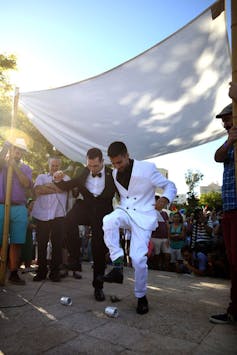
By Orit Avishai
Demonstrations against the Israeli government’s efforts to radically overhaul the country’s judicial system have become a weekly occurrence. Often rainbow pride banners pop with color amid the sea of blue and white national flags.
LGBTQ allies are hardly the only groups protesting the new government: Secular Jews, liberals and people concerned that the plan will erode democracy have come out to the streets in droves since early 2023. But among other concerns, many Israelis fear that hard-line conservative ministers will roll back LGBTQ rights. And LGBTQ issues are a potent symbol of a chasm fueling debate over the judicial overhaul: secular and religious Israeli Jews’ very different visions of the Jewish state.
Prime Minister Benjamin Netanyahu’s governing coalition is the most religious and nationalist in the country’s history. His supporters claim that Israel’s Supreme Court, whose rulings guaranteed many of the rights LGBTQ people have today, is interventionist and needs to be reined in. Opponents, however, fear that Israel’s balance of being a democratic state and a Jewish one is tipping away from democracy.
But how did Israel become relatively accepting of LGBTQ people in the first place – especially given the ways religion and state are entangled in its laws? The answer does not rest solely with the Supreme Court. The legislature, popular culture and activist organizations were key – including Orthodox groups known as the Proud Religious Community, a focus of my ethnographic research. I believe the lack of separation between law and religion has at times actually helped advance LGBTQ Jews’ rights. Activists’ carefully picked agenda and its convergence with national interests have also aided the movement.
The ‘gay decade’
Chronicles of Israel’s LGBTQ rights often focus on changes that occurred during the so-called “gay decade” that began in 1988, when the Knesset, the Israeli parliament, repealed sodomy laws. The groundwork for that, however, began decades earlier.
Israel’s first LGBTQ organization, The Aguda, was founded in 1975 as a grassroots, volunteer-based human rights nonprofit. In its early years, many members were closeted, but by the early 1980s some LGBTQ activists were willing to put a public face on the movement by sharing their stories in interviews, public hearings and lobbying efforts. A groundbreaking 1983 Aguda pamphlet appealed to scientific evidence and international legal precedents to make the case for ending prejudice and discrimination.
A dizzying array of rights were achieved during the gay decade and beyond. Sexual orientation was declared a protected employment category in 1992, and openly gay women and men were allowed to serve in the military in 1993. Same-sex partners were recognized for welfare in 1994, national insurance benefits in 1999 and pension benefits in 2000.

Gali Tibbon/AFP via Getty Images
Because religious authorities have monopoly over marriage and divorce in Israel, same-sex marriage is not legalized. Nevertheless, over the past 20 years, same-sex couples and their families have won many other legal protections, including inheritance, stepchild adoption, divorce and surrogacy rights.
Uneven gains
Beyond the law, LGBTQ Israelis have also benefited from increasing cultural visibility and public acceptance. Municipal and state investments have made the Tel Aviv Pride Parade a top destination for Pride month travelers around the world. Israeli transgender singer Dana International won the Eurovision contest in 1998, and gay characters began to appear in mainstream movies and popular TV by the turn of the millennium. The late 1990s and the aughts also saw a significant expansion of organizations to support LGBTQ people and their families.
Still, access to protections has always been uneven. The early gay “revolution” was predominantly secular, and remains so. It is mostly an urban, Jewish, Ashkenazi affair – referring to Jews whose families were from Europe. Transgender people won employment protections and the right to serve in the military more than a decade after gays and lesbians won the same rights.
Attitudes toward LGBTQ Israelis have been slower to change in conservative religious communities, and same-sex relationships remain taboo in ultra-Orthodox circles. Since the turn of the 21st century, however, Orthodox activists have begun to organize, as I document in my recent book “Queer Judaism.”
Path to acceptance
Although a minority, religious conservatives have been power brokers and members of government coalitions for most of the state of Israel’s history. Yet certain aspects of the country’s political landscape help explain the LGBTQ movement’s successes – as do activists’ strategic choices.

Gali Tibbon/AFP via Getty Images
First, the lack of separation of state and religion means that Israel does not offer a civil marriage option, even for opposite-sex couples. The legal system developed alternatives for heterosexual Jewish couples who did not want to or could not marry through the Jewish rabbinate, such as extending many of marriage’s civil benefits to cohabitating couples. These alternatives were relatively easy to extend to same-sex couples.
Second, the goals that the Israeli LGBTQ movement has prioritized – equal rights to parenthood, family and military service – aligned well with Jewish Israeli common values and national priorities. They often avoided alliances with other causes that were considered controversial, especially Palestinian rights.
Third, Tel Aviv’s fun façade as a thriving gay scene served national interests. Politicians from across the political spectrum have used Israel’s liberal record on LGBTQ rights to bolster its democratic credentials while ignoring criticism over systemic human rights violations toward Arab citizens of the state and Palestinians in the occupied territories – a phenomenon sometimes called “pinkwashing.”
Pivotal moment?
The same forces that facilitated Israel’s LGBTQ rights revolution, however, may now undo hard-won gains.

Ahmad Gharabli/AFP via Getty Images
Jewish religious conservatives have long viewed acceptance of LGBTQ people’s rights as an affront to the state’s Jewish character. In the past, ruling coalitions with both political moderates and Orthodox parties guaranteed some modicum of compromise, including on LGBTQ rights. But the current ruling coalition rests on the support of religious ultranationalists, including ministers who have openly opposed LGBTQ rights.
Another factor is the current right-wing government’s unambiguous territorial ambitions. Its guiding document declares that “The Jewish people have an exclusive and inalienable right to all parts of the Land of Israel,” and one senior minister has even hinted at his support for Arab expulsion. With such nationalistic aims out in the open, the state may no longer feel as much of a need to use LGBTQ rights to defend its human rights record.
During research for my book about Orthodox LGBTQ activism in Israel, I noticed how efforts to change conservative communities’ ideas about equality and acceptance were grounded in claims of a shared Jewish experience. However, LGBTQ activists I talked to did not challenge other aspects of far-right politics.
Critics of LGBTQ activists’ approach warn that prioritizing narrower interests, rather than a broader social justice platform, fails to rein in Israel’s broader shift away from liberal democratic norms – which could jeopardize their own hard-won gains as well.
Orit Avishai, Professor of Sociology, Fordham University
This article is republished from The Conversation under a Creative Commons license. Read the original article.
![]()
Orit Avishai is Professor of Sociology at Fordham University.





























Samuel L. Bronkowitz says
“Even in Israel” lmao, come on. Israel is an apartheid state.